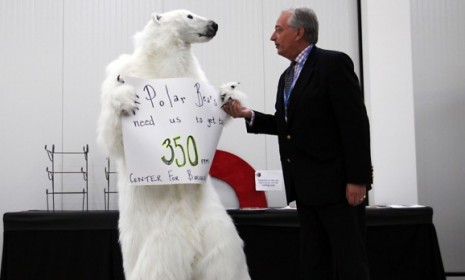Cancun's 'hollow' climate conference
Attendees of the U.N. talks in Mexico emerged with a deal of sorts — but did the conference really achieve significant results?

By this weekend's conclusion of the Cancun climate conference, representatives of nearly 200 governments had agreed to create a Green Climate Fund to foster environmentally friendly development in poor countries. The deal also sets up new incentives for nations that protect their forests. But attendees back-burnered the issue of establishing an international treaty to reduce emissions of heat-trapping greenhouse gases — something that has proved elusive over 20 years of negotiations. Does that mean Cancun was a failure or should any deal be considered progress? (Watch a report about the summit's end)
Cancun was a failure — and this deal will be, too: The only thing Cancun accomplished, says Kirsty Wright in World Development Movement, was to "lower expectations" so far that even an agreement filled with "hollow promises" is being celebrated. The new climate fund will be managed by the World Bank, "one of the world's most discredited and undemocratic institutions." And, if history is any guide, wealthy nations will renege on their promises to pump billions of dollars into the fund, making this a disappointing "Christmas present" indeed.
"From Copenhagen to Cancun — has anything really changed?"
The Week
Escape your echo chamber. Get the facts behind the news, plus analysis from multiple perspectives.

Sign up for The Week's Free Newsletters
From our morning news briefing to a weekly Good News Newsletter, get the best of The Week delivered directly to your inbox.
From our morning news briefing to a weekly Good News Newsletter, get the best of The Week delivered directly to your inbox.
The conference at least restored U.N. credibility: This "modest deal" might not save the planet, says Suzanne Goldenberg in Britain's Guardian, but it salvaged some credibility for the conference's U.N. organizers. After last year's disastrous Copenhagen talks, another breakdown in Cancun could have killed these "dysfunctional" climate negotiations for good.
"Cancun agreement rescues U.N. credibility but falls short of saving planet"
Actually, Cancun was a big success: Cancun was "a diplomatic triumph," says Fred Pearce in New Scientist. Dozens of nations — "rich and poor, forested and industrialized" — proudly made it clear they are willing to act unilaterally to make a "remarkable new low-carbon world" a reality. A global commitment is still proving elusive, but as long as Brazil, for example, is dramatically reducing deforestation in the Amazon, there's hope.
"Cancun analysis: Dawn breaks on low-carbon world"
A free daily email with the biggest news stories of the day – and the best features from TheWeek.com
-
 5 chilling cartoons about increasing ICE aggression
5 chilling cartoons about increasing ICE aggressionCartoons Artists take on respect for the law, the Fourth Amendment, and more
-
 Political cartoons for January 24
Political cartoons for January 24Cartoons Saturday's political cartoons include 3D chess, political distractions, and more
-
 Ryanair/SpaceX: could Musk really buy the airline?
Ryanair/SpaceX: could Musk really buy the airline?Talking Point Irish budget carrier has become embroiled in unlikely feud with the world’s wealthiest man